14-15学年高中英语(人教新课标,必修五)课件:Unit 1 Great scientists Period 5 Listening exercise(共29张PPT)
文档属性
| 名称 | 14-15学年高中英语(人教新课标,必修五)课件:Unit 1 Great scientists Period 5 Listening exercise(共29张PPT) | 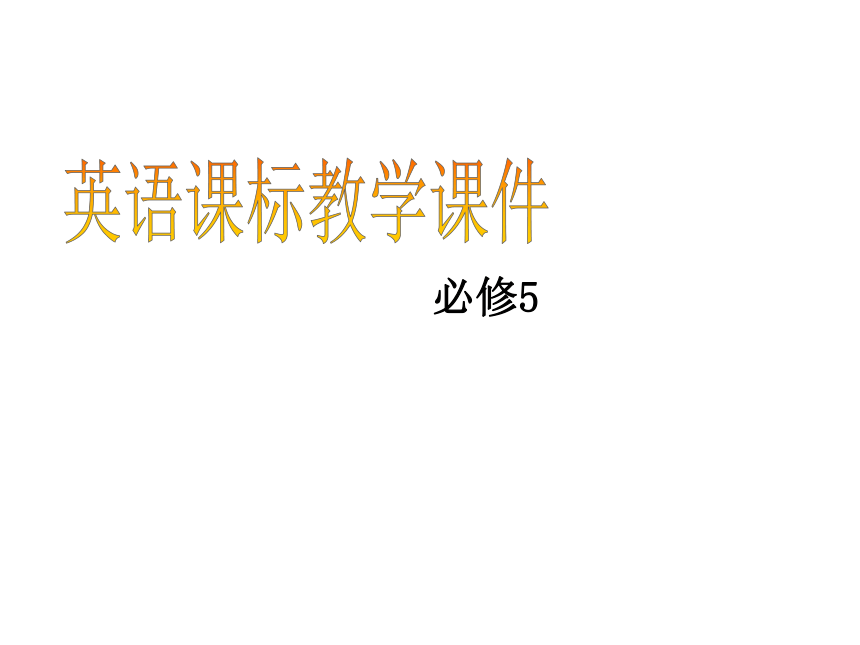 | |
| 格式 | zip | ||
| 文件大小 | 5.2MB | ||
| 资源类型 | 教案 | ||
| 版本资源 | 人教版(新课程标准) | ||
| 科目 | 英语 | ||
| 更新时间 | 2014-09-10 05:55:30 | ||
图片预览

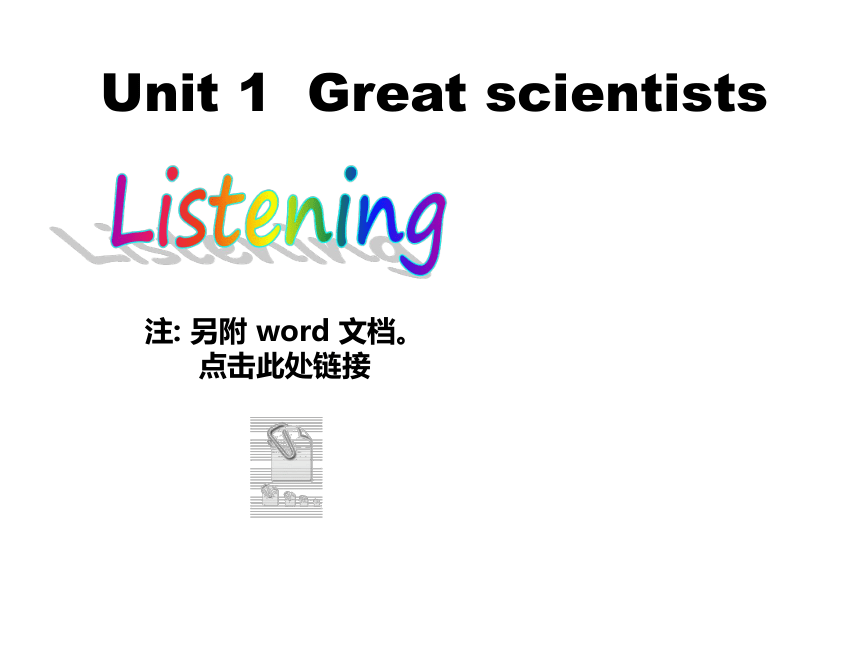
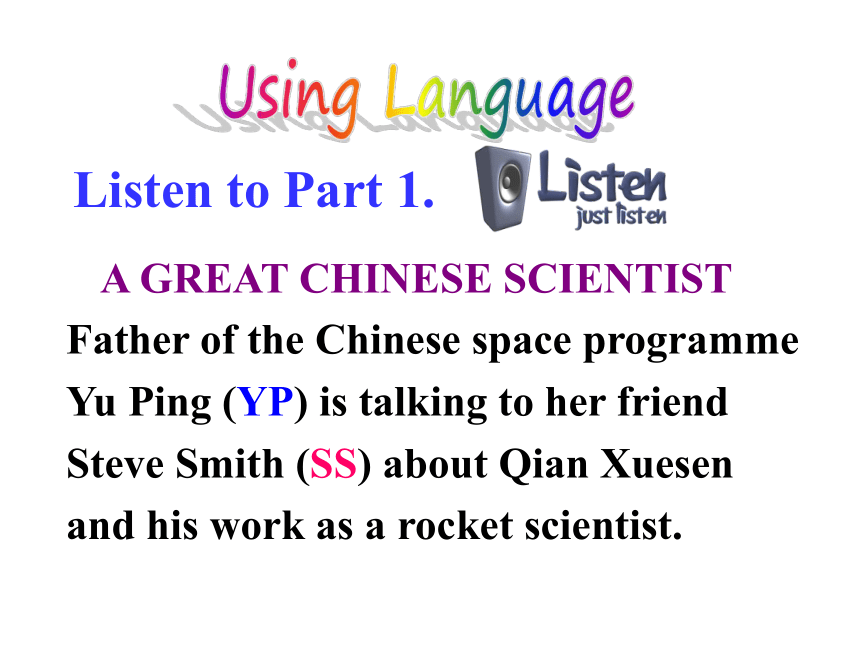
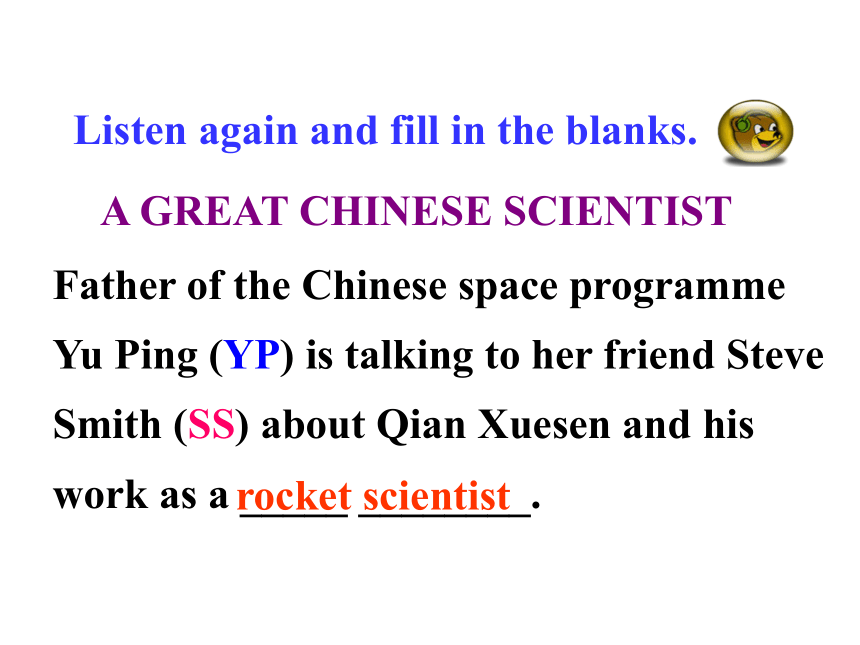
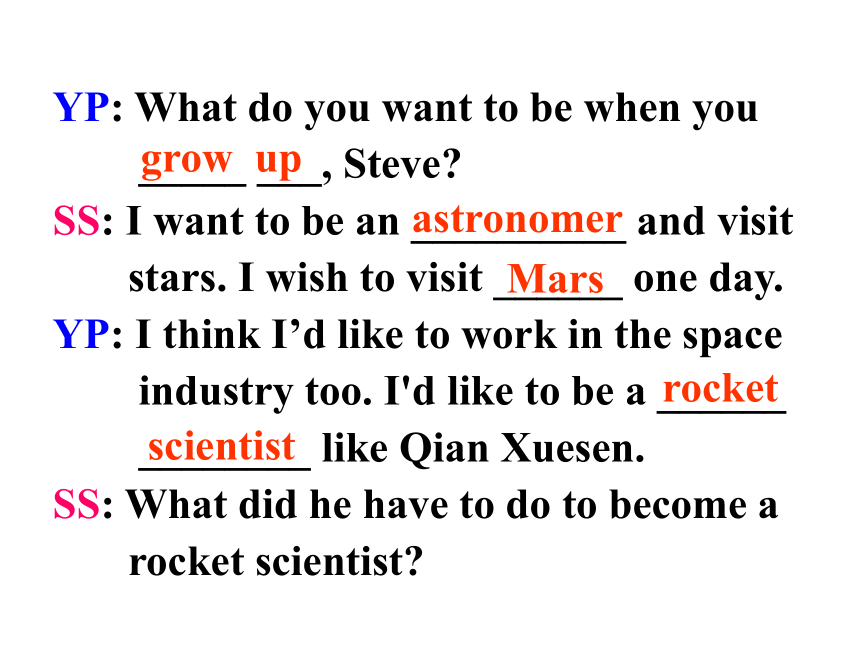
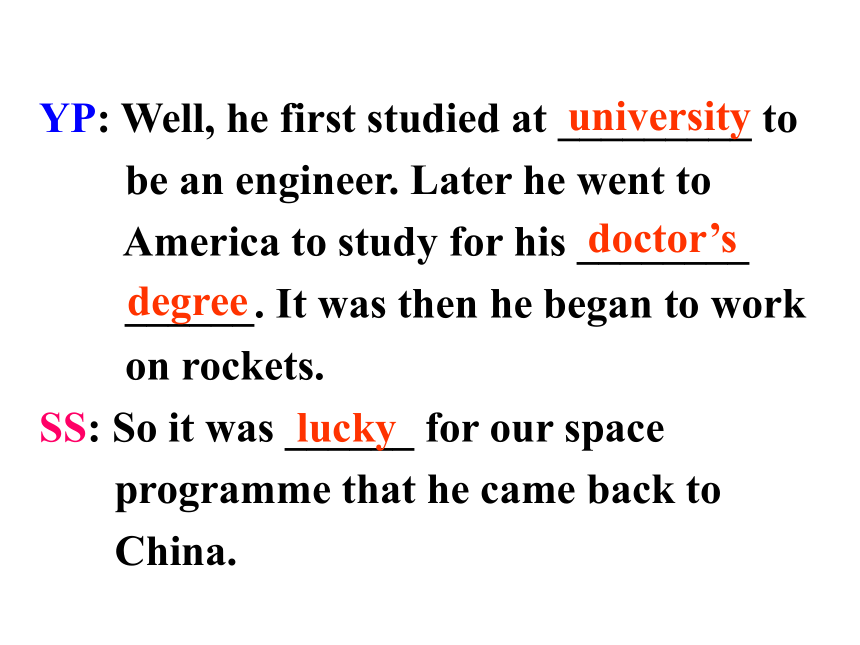
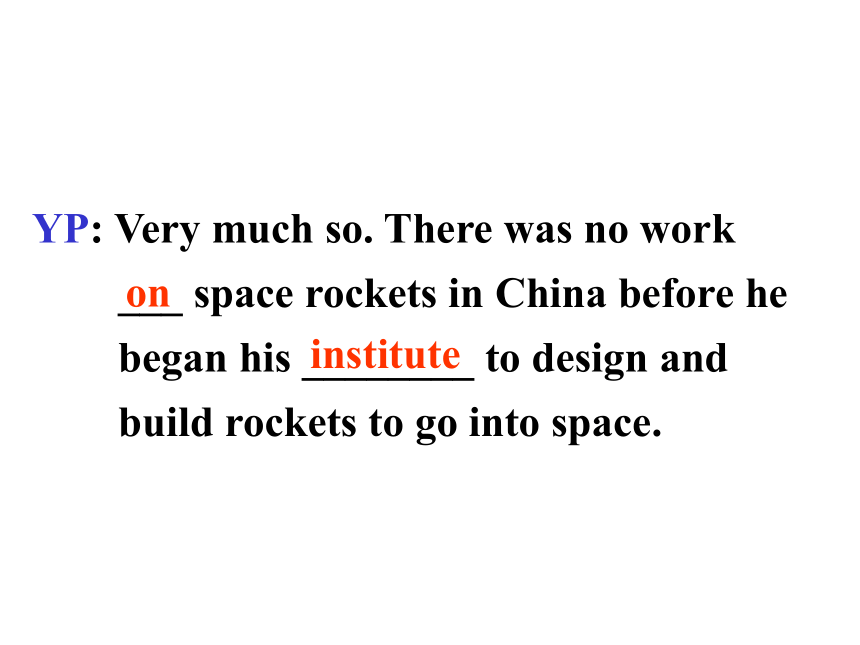

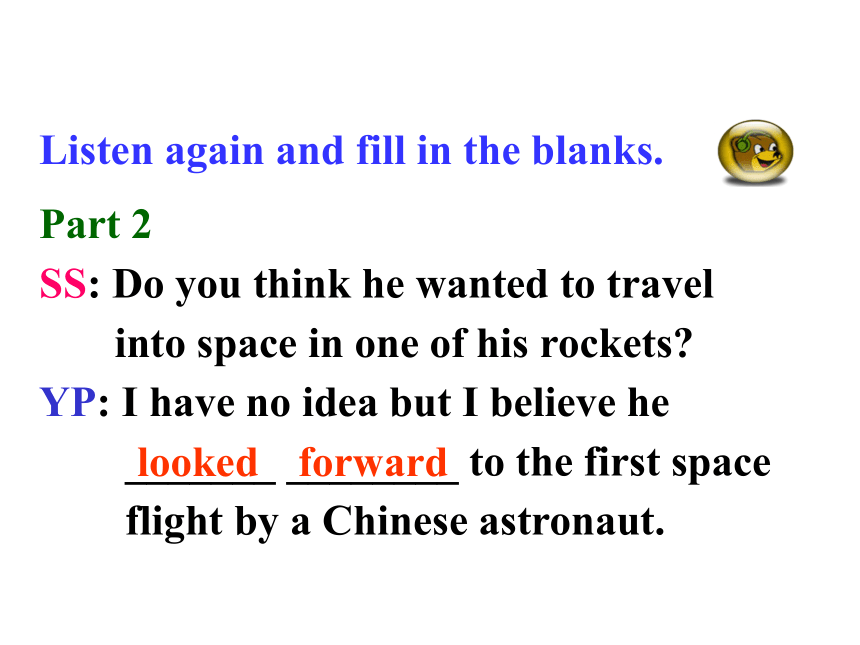
文档简介
课件29张PPT。英语课标教学课件必修5Listening Unit 1 Great scientists注: 另附 word 文档。
点击此处链接Listen to Part 1.Using LanguageFather of the Chinese space programme
Yu Ping (YP) is talking to her friend
Steve Smith (SS) about Qian Xuesen
and his work as a rocket scientist. A GREAT CHINESE SCIENTISTFather of the Chinese space programme
Yu Ping (YP) is talking to her friend Steve
Smith (SS) about Qian Xuesen and his
work as a _____ ________. A GREAT CHINESE SCIENTISTrocket scientistListen again and fill in the blanks.YP: What do you want to be when you
_____ ___, Steve?
SS: I want to be an __________ and visit
stars. I wish to visit ______ one day.
YP: I think I’d like to work in the space
industry too. I'd like to be a ______
________ like Qian Xuesen.
SS: What did he have to do to become a
rocket scientist?grow upastronomerMarsscientistrocketYP: Well, he first studied at _________ to
be an engineer. Later he went to
America to study for his ________
______. It was then he began to work
on rockets.
SS: So it was ______ for our space
programme that he came back to
China.universitydegreedoctor’sluckyYP: Very much so. There was no work
___ space rockets in China before he
began his ________ to design and
build rockets to go into space. instituteonListen to Part 2.Part 2
SS: Do you think he wanted to travel
into space in one of his rockets?
YP: I have no idea but I believe he
_______ ________ to the first space
flight by a Chinese astronaut.forwardlookedListen again and fill in the blanks.SS: Yes. Now that China has ______
satellites _____ space. I hope we’ll be
the _____ to land on Mars. That would
really be something special and if I
were that astronaut I would put Qian
Xuesen’s _______ on Mars to show
how much we _______ his work.sentintofirstadmirepictureYP: Indeed. He is rightfully called the
_____ of the Chinese space programme.
He is my _____ and he is why I want to
be a rocket scientist.
SS: Well, we’d better ___ __ ____ our
homework. We need good _______
to get into university.
YP: Right you are. See you, then.
SS: See you.fatherheroget on withgradesWorkbook-Listening NAMING A FLOWER
Robert Briggs (RB) is talking to Zhang
Wei (ZW) about a new kind of lily he
has found. NAMING A FLOWER
Robert Briggs (RB) is talking to Zhang
Wei (ZW) about a new kind of ____ he
has found. Listen again and fill in the blanks.lilyZW: Hello Robert. What’s that book
you’re ________?
RB: A book that helps you _______ a
flower.
ZW: I see. Why do you want that?
RB: I’ve found this lily. It looks ________
to me. So I want to ____ ____ if it’s
new or not. Our biology teacher told
me that if it’s already ______, I’d
find it in this book.carryingidentifydifferentfind outknownZW: Wow! So you think you may have
found a new lily?
RB: I hope so, but I have to do some
________ first to find out for sure.
ZW: What happens if it’s in the book?
RB: It means that somebody else has
found it and _______ it. Then I’ll
know its biological name.
ZW: What do you mean by the ________
name?researchnamedbiologicalRB: Actually like us a flower has _____
names. The first is the group of
flowers it _______ to – like a family
name. A rose is one such group. The
second is the kind of flower – like a
_____ name. It may describe what
the rose ______ like; for example, the
colour of an autumn ______. Together
you get the flower’s name, which is
Rose Autumn Sunset.twobelongsgivenlookssunsetZW: Gosh! Who made that _______?
RB: A great ________ called Carl
Linnaeus. He lived in Sweden
from _____ to 1778.
ZW: So long ago!
RB: Yes, and he solved a very _______
problem for biology.
ZW: What was that?systemseriousscientist1707RB: Before him _______ could tell if a
plant was new, as there was no
way of ________. There’re so
many plants, you see!
ZW: Yes, I __________ that! So his
system is still used?
RB: ______ it is. If my flower isn’t in
this book, I’ll know that I’ve found
a new kind of lily.nobodycheckingappreciateIndeedZW: That’s great! Can I come and
help you? This research _______
fun.
RB: Yes, and if I’m lucky …
(fading out)soundsListen to Part 1.Workbook-Listening Task A MATHEMATICIAN'S PROBLEM
John Smith (JS) is talking to Zhao Yang
(ZY) about a mathematician who interests him. A MATHEMATICIAN'S PROBLEM
John Smith (JS) is talking to Zhao Yang
(ZY) about a mathematician who
________ him. Listen again and fill in the blanks.interestsJS: Do you know that we’ve been
studying Euler in ______?
ZY: Who is he? I’ve never ______ of
him.
JS: Well, he was a famous
mathematician in the _________
century. He revised all the _____
mathematics that was known in
his day.mathsheardeighteenthpureZY: That probably wasn’t very much.
JS: You’re wrong there. He wrote
_____ _____ any other
mathematician before or since.
ZY: Really! Well, what did he do?
JS: He introduced a lot of _______ into
mathematics ____ ___ pi (π) and
the terms sine and cosine.more thansymbolssuch asZY: Wow!
JS: And he did half of this work
when he was ______.
ZY: How did he do that?
JS: He told his ideas to someone
else who _____ them _____.blindwrotedownListen to Part 2.Part 2
ZY: What were his ____________?
JS: He introduced a new _______ of
mathematics called topology.
It helps you understand things by
using ________. The _______ map
is a good example. Listen again and fill in the blanks.achievementsbranchdiagramssubway It doesn’t tell you ________ but
it shows how stations ________
together.
ZY: How did he start topology?
JS: Well, in _____ he was _______
by a problem in the city of
K?nigsberg where he lived.distancesconnect1735inspired Look at the map in your book.
K?nigsberg had a river running
________ it. The centre is an ______.
As the river ______ the island, it breaks
into two parts. Seven bridges were built
_____ the river. Euler wondered if you
could walk _______ the city so that you
_____ each bridge only once.throughislandpassesoveraroundcrossZY: Let me try that. It sounds quite
______ to me.
JS: Try, but it’s not ___ easy ____ it
looks.simpleasas
点击此处链接Listen to Part 1.Using LanguageFather of the Chinese space programme
Yu Ping (YP) is talking to her friend
Steve Smith (SS) about Qian Xuesen
and his work as a rocket scientist. A GREAT CHINESE SCIENTISTFather of the Chinese space programme
Yu Ping (YP) is talking to her friend Steve
Smith (SS) about Qian Xuesen and his
work as a _____ ________. A GREAT CHINESE SCIENTISTrocket scientistListen again and fill in the blanks.YP: What do you want to be when you
_____ ___, Steve?
SS: I want to be an __________ and visit
stars. I wish to visit ______ one day.
YP: I think I’d like to work in the space
industry too. I'd like to be a ______
________ like Qian Xuesen.
SS: What did he have to do to become a
rocket scientist?grow upastronomerMarsscientistrocketYP: Well, he first studied at _________ to
be an engineer. Later he went to
America to study for his ________
______. It was then he began to work
on rockets.
SS: So it was ______ for our space
programme that he came back to
China.universitydegreedoctor’sluckyYP: Very much so. There was no work
___ space rockets in China before he
began his ________ to design and
build rockets to go into space. instituteonListen to Part 2.Part 2
SS: Do you think he wanted to travel
into space in one of his rockets?
YP: I have no idea but I believe he
_______ ________ to the first space
flight by a Chinese astronaut.forwardlookedListen again and fill in the blanks.SS: Yes. Now that China has ______
satellites _____ space. I hope we’ll be
the _____ to land on Mars. That would
really be something special and if I
were that astronaut I would put Qian
Xuesen’s _______ on Mars to show
how much we _______ his work.sentintofirstadmirepictureYP: Indeed. He is rightfully called the
_____ of the Chinese space programme.
He is my _____ and he is why I want to
be a rocket scientist.
SS: Well, we’d better ___ __ ____ our
homework. We need good _______
to get into university.
YP: Right you are. See you, then.
SS: See you.fatherheroget on withgradesWorkbook-Listening NAMING A FLOWER
Robert Briggs (RB) is talking to Zhang
Wei (ZW) about a new kind of lily he
has found. NAMING A FLOWER
Robert Briggs (RB) is talking to Zhang
Wei (ZW) about a new kind of ____ he
has found. Listen again and fill in the blanks.lilyZW: Hello Robert. What’s that book
you’re ________?
RB: A book that helps you _______ a
flower.
ZW: I see. Why do you want that?
RB: I’ve found this lily. It looks ________
to me. So I want to ____ ____ if it’s
new or not. Our biology teacher told
me that if it’s already ______, I’d
find it in this book.carryingidentifydifferentfind outknownZW: Wow! So you think you may have
found a new lily?
RB: I hope so, but I have to do some
________ first to find out for sure.
ZW: What happens if it’s in the book?
RB: It means that somebody else has
found it and _______ it. Then I’ll
know its biological name.
ZW: What do you mean by the ________
name?researchnamedbiologicalRB: Actually like us a flower has _____
names. The first is the group of
flowers it _______ to – like a family
name. A rose is one such group. The
second is the kind of flower – like a
_____ name. It may describe what
the rose ______ like; for example, the
colour of an autumn ______. Together
you get the flower’s name, which is
Rose Autumn Sunset.twobelongsgivenlookssunsetZW: Gosh! Who made that _______?
RB: A great ________ called Carl
Linnaeus. He lived in Sweden
from _____ to 1778.
ZW: So long ago!
RB: Yes, and he solved a very _______
problem for biology.
ZW: What was that?systemseriousscientist1707RB: Before him _______ could tell if a
plant was new, as there was no
way of ________. There’re so
many plants, you see!
ZW: Yes, I __________ that! So his
system is still used?
RB: ______ it is. If my flower isn’t in
this book, I’ll know that I’ve found
a new kind of lily.nobodycheckingappreciateIndeedZW: That’s great! Can I come and
help you? This research _______
fun.
RB: Yes, and if I’m lucky …
(fading out)soundsListen to Part 1.Workbook-Listening Task A MATHEMATICIAN'S PROBLEM
John Smith (JS) is talking to Zhao Yang
(ZY) about a mathematician who interests him. A MATHEMATICIAN'S PROBLEM
John Smith (JS) is talking to Zhao Yang
(ZY) about a mathematician who
________ him. Listen again and fill in the blanks.interestsJS: Do you know that we’ve been
studying Euler in ______?
ZY: Who is he? I’ve never ______ of
him.
JS: Well, he was a famous
mathematician in the _________
century. He revised all the _____
mathematics that was known in
his day.mathsheardeighteenthpureZY: That probably wasn’t very much.
JS: You’re wrong there. He wrote
_____ _____ any other
mathematician before or since.
ZY: Really! Well, what did he do?
JS: He introduced a lot of _______ into
mathematics ____ ___ pi (π) and
the terms sine and cosine.more thansymbolssuch asZY: Wow!
JS: And he did half of this work
when he was ______.
ZY: How did he do that?
JS: He told his ideas to someone
else who _____ them _____.blindwrotedownListen to Part 2.Part 2
ZY: What were his ____________?
JS: He introduced a new _______ of
mathematics called topology.
It helps you understand things by
using ________. The _______ map
is a good example. Listen again and fill in the blanks.achievementsbranchdiagramssubway It doesn’t tell you ________ but
it shows how stations ________
together.
ZY: How did he start topology?
JS: Well, in _____ he was _______
by a problem in the city of
K?nigsberg where he lived.distancesconnect1735inspired Look at the map in your book.
K?nigsberg had a river running
________ it. The centre is an ______.
As the river ______ the island, it breaks
into two parts. Seven bridges were built
_____ the river. Euler wondered if you
could walk _______ the city so that you
_____ each bridge only once.throughislandpassesoveraroundcrossZY: Let me try that. It sounds quite
______ to me.
JS: Try, but it’s not ___ easy ____ it
looks.simpleasas
